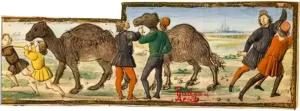First scared by the sight of a Camel, a Man eventually became so comfortable around the Camel he allowed a child to ride him.
Use serves to overcome dread.

Townsend version
When man first saw the Camel, he was so frightened at his vast size that he ran away. After a time, perceiving the meekness and gentleness of the beast’s temper, he summoned courage enough to approach him. Soon afterwards, observing that he was an animal altogether difficient in spirit, he assumed such boldness as to put a bridle in his mouth, and to let a child drive him.
Moral
Use serves to overcome dread.

L’Estrange version
Upon the first sight of a camel, all people ran away from’t, in amazement at so monstrous a bulk. Upon the second sight, finding that it did them no hurt, they took heart upon’t, went up to’t, and view’d it. But when they came, upon further experience, to take notice, how stupid a beast it was, they ty’d it up, bridled it, loaded it with packs and burdens; set boys upon the back on’t, and treated it with the last degree of contempt.
Moral
Novelty surprises us, and we have naturally a horror for uncouth misshapen monsters; but ’tis our ignorance that staggers us, for upon custom and experience, all these buggs grow familiar, and easy to us.

Gherardo Image from 1480

Camelus Primo Conspicatus
Qui camelum primus conspicatus est, effugit; qui secundus, appropinquavit; qui tertius, frenum fecit, quo eum duceret.
Moral
Nam quod primo novum ac terribile videtur, mox usu cotidiano solita res fit ac mansueta.
Perry #195
